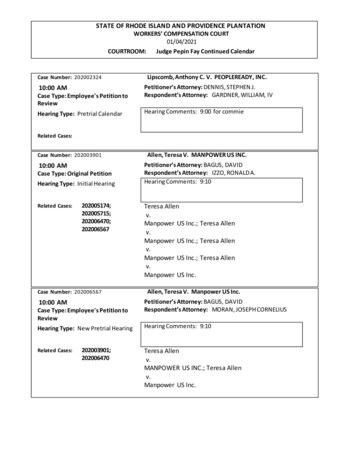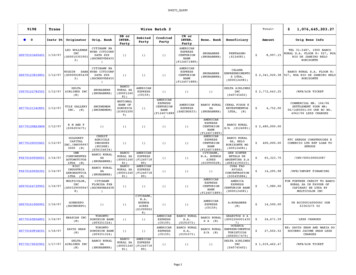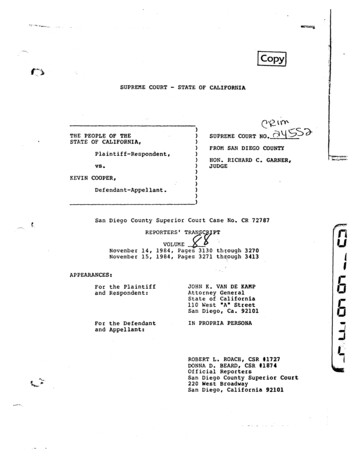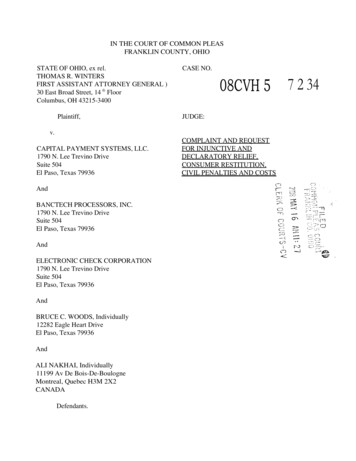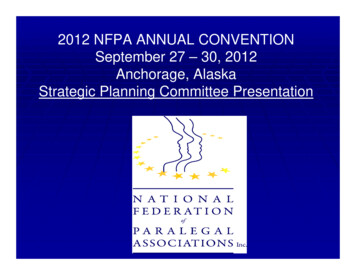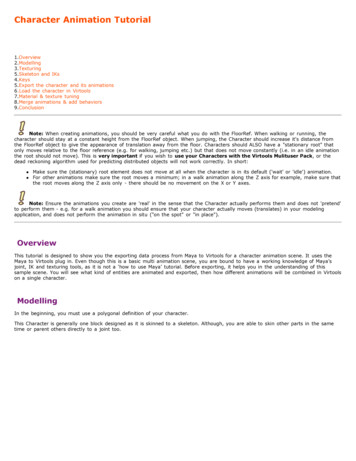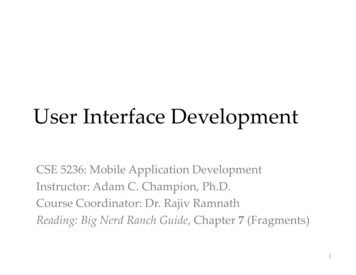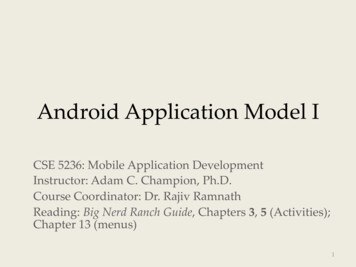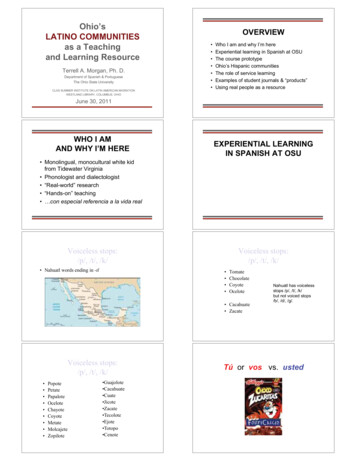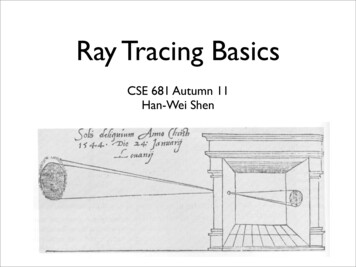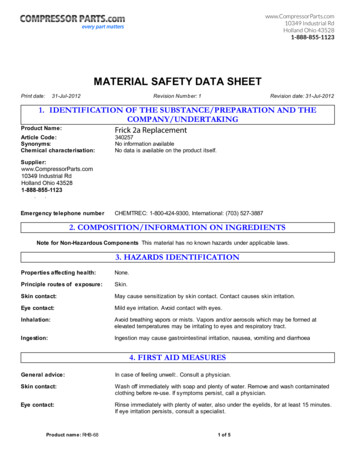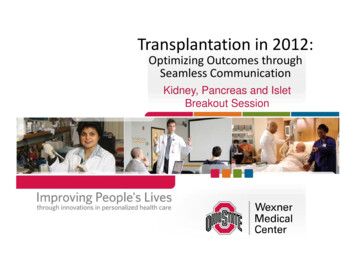
Transcription
Transplantationpin 2012:Optimizing Outcomes throughSeamless CommunicationKidney, Pancreas and IsletBreakout Session
Kidney Transplantation as aTreatment of Choice for ESRDUday S. Nori, MDAssistant Professor of MedicineDivision of NephrologyComprehensive Transplant CenterThe Ohio State University Medical Center
Learning Objectives Indications for kidney transplantation Understand why kidney transplant is thetreatment of choice for patients with advancedChronic Kidney Disease Briefly discuss the main barriers fortransplantation Discuss the novel strategies for “unsuitable”patients to have access to successfultransplantation
Adjusted allall--cause mortality in the ESRD& generall populations,l tibby age, 2007ESRD: prevalent ESRDpatients, 2007. GeneralMedicare: non-ESRDpatients with at leastone month of Medicareeligibility in 2007.Adjusted for gender &race. Medicarepatients, 2007, used asreference cohort.
Kidney Transplantation offers Improved PatientSurvivalWolfe RA et al. Al NEJM 1999
Indications for Kidney Transplantation Anyone with advanced chronic kidney disease GFR of 15 ml/min If acute kidney injury – wait for renal recovery If livingg donor and not yyet on dialysis:y Okay to wait till symptomatic If no livingg donor – refer when GFR is 25 ml/m WaitWait--list when GFR is 20 ml/min
Barriers to Transplantation That Are Amenablefor Intervention Older age ABO incompatibility Highly sensitized – prepre--existing antianti--HLAantibodies Cardiovascular and other medical diseases Psychosocial
Older Patients with ESRD
.Have Improving Transplantation Rates Data from USRDS databasePatients age at 1st ESRD treatmentMost
And Better Clinical Outcomes
PRE--EMPTIVE TRANSPLANTPRE Definition and outcomes Barriers Lack of timely referral Lack of education Financial issues Insurance LivingLi i ddonor expenses Psychosocial issues
Pre--emptive TransplantPreMeier-Kriesche et al, Am J Transplant 2004;4:1662.
OSUWMC Transplant StatisticsKidney Waiting times (median time to transplant)25 months (national average 72 months) Waitlist mortality:8% (national average 6%) Survival rates: July 2012 Scientific Registry of Transplant Recipients (SRTR) One year 96% (national average 97%) Three year 92% (national average 92%)
Take Home Points Kidney transplant is the preferred choice of renalreplacement therapy Majority of the patients approaching dialysis probablysuitable for transplant evaluation Problems previously perceived to be barriers are beingsurmounted with novel approaches PrePre-emptiveptransplantpand livingg donor transplantspstrongly encouraged
Transplantationpand Livingg Kidneyy Donation atThe OSUWMC Comprehensive TransplantCenterRobin Petersen-Webster, LPN, CCTCLiving Kidney Donation CoordinatorDonor Exchange Program CoordinatorThe OSUWMC Comprehensive Transplant Center
Transplant SignatureProgramTeamwork committed toQuality and Quantity of Life –OSUWMC
The Transplant TeamThe Ohio State University Wexner Medical CenterTransplant Team IncludesTransplant Surgeons (7)TransplantpNephrologistspg((4))Transplant Nurse Coordinators (19)Clinical Transplant PsychologistNurse Practitioners and Physician AssistantsTransplant Pharmacy TeamInfectious Disease TeamSocial WorkersFinancial CoordinatorPatient Rx Assistance Coordinator17
Referral Process Individuals seeking kidney transplantation should be referred whenGFR is approximately 20 ml/min. Referrals can be made by mail or fax. Patients may self-refer. Referral information should include: Demographics Current lab reports, including ABO Cardiac Stress Test / Echo (if available) H&P outlining pertinent medical history Psycho-social concerns Current dialysis information Contact Numbers: Pre-Transplant Office (614)293-6724Pre-Transplant Fax (614)293-671018
Referral Process The OSUWMC PreTransplant Office will send a welcome package topotential candidates once a referral is received.A letter confirming receipt of referral is sent to the referring physicianphysician. Potential Recipients are scheduled for a mandatory educationsession,iandd willill beb givenian appointmenti tt forf theirth i fformallpretransplant evaluation at conclusion of the education session. A living kidney donor team member contacts each referral to discussthe possibility of living kidney donation. The PreTransplant Office verifies benefits for transplantation atOSUWMC prior to full evaluation.
Psycho-Social Considerations Noncompliance with medical treatment Active Substance Abuse / Dependence Untreated Severe Mental Health Disorder Cognitive Limitations with InadequateSocial Support Inability to Afford Post Transplant Treatment
Living Kidney Donation The best option for a patient waiting for a kidney is to receive a kidney from aliving donor. Living donor transplants can be arranged in as short as six weeksweeks, versus yearsof waiting on the deceased donor list. Approximately half of all kidney transplants performed at the OSUWMCTransplant Center are from living donors. Our center welcomes non-directed / altruistic donors Incompatible kidney donors and recipients benefit from our donor exchangeprogram. Our living kidney donation volumes are among the top 5% in the U.S. The CTC operates a specialized donor clinic to follow donors for two years aftertheir donation. The OSUWMC Transplant Center has been recognirecognizeded as aBest Practice Center by CMS for excellence in living kidney donor follow up care.
Donor ExchangePaired Donation22Donor Exchange Chain
Donor Exchange Programs The OSUWMC Comprehensive Transplant Centers offers patients theoption of donor exchange when a compatible donor is not available. We have a very active internal donor exchange programprogram. We partner with The National Kidney Registry, Alliance for PairedDonation and The UNOS KPD Program to find matches for those weare unable to match internally. All surgeries are performed at The OSUWMC regardless of location ofmatched donor or recipient. Donor Exchange transplants accounted for 19.5% of the total kidneytransplantspcompletedpat our center in FY 2011-2012. 17% werecompleted through our internal exchange program.
Post-Transplant ManagementMelissa Mazur RN, BSN, CCTCPost Transplant Coordinator
Post-Transplant ManagementPatients are managed here at OSU throughout the life of their transplantedorgan.Patients are managed with the help of many other healthcare providers Primary Care PhysicianReferring NephrologistsEndocrinologyGastroenterologyOther specialties
Post-Transplant Management Patients are assigned a transplant nurse coordinator followingtransplant. Coordinator will meet the patient prior to discharge from the hospital. Patients are encouraged to call the post transplant officeffwith anyquestions or concerns. The post transplant coordinator is the first line of contact when patientscall the office. Post transplant phone number 1-800-626-2538
Post-Transplant Management From transplant to 1 year patients are followed by a transplantsurgeon Patients are typically seen in the clinic 1 month3 months6 monthsAnd 1 year post transplant prior to being transferredfto a transplantnephrologist Patients 1 year post transplant are then transferred to a transplantnephrologist. PPatientsti t are encouragedd tot followf llup withith ththeiri referringf inephrologists and primary care physicians routinely.
Post-Transplant Management We manage more than just the transplant organ All aspects of the transplant patients care is managed by our transplantteam with the help of the patients referring physician and the rest of theirhealthcare team. We routinely draw the following labs Cholesterol levelsIron studiesliver and kidney functionsElectrolytesCBCPTH
Post-Transplant Management Patients are given access to our transplant computer software- Transchart. This gives them the ability to enter and review their vital signs and labs. Enter Vital Signs Review Labs Review current medication list and Request medication refills This helps the patient to become more involved in their own care. Referring and treating physicians are also able to obtain access toTranschart to assist with coordinator of care for these patients.
Post-Transplant Management Post transplant office can be reached at 1-800-626-2538 Please call with any questions or concerns.
Type 1 Diabetes:PPancreasVS IsletI lTransplantationpClinical Trial IRB#2006H0200Amer Rajab, MD, FACS, PhDAssociate Professor of SurgeryDirector Pancreas and Islet TransplantationDirector Pediatric TransplantationThe Comprehensive Transplant CenterThe Ohio State University
Type 1 Diabetes Also known as juvenilediabetes CCommonlyl didiagnosedd iinchildren, adolescents, or youngadults Over reactive immuneresponse destroys insulinproducing islet beta cells Therefore,, the bodyy does notproduce insulin to properlycontrol blood glucose levels
Tissue replacement: whole pancreas orislet transplantation is currently the onlyway to restore physiologic glycemiccontrol
Options The whole pancreas (standard of care) Simultaneous with kidney transplantation (KP) After kidney transplantation (PAK) Alone (PTA) The islets only (experimental/clinical trials)
Statistics Number of transplant centers performing pancreas transplant: 107 Total number of pancreas transplants: 17,888 The total prevalence of diagnosed Insulin DependentDiabetes Mellitus (IDDM) in the United States (all ages,2005) is approximately 1,400,000-2,800,000 people (http://diabetes.niddk.nih.gov/dm/pubs/statistics)
Statistics OSU (1988-2012): 927 total pancreas transplants K/P: 802 Pancreas: 125 Kidney/Pancreas Waiting times (median time to transplant) 6 months ((national averageg 14 months)) Waitlist mortality: 8% (national average 6%) Survival rates: July 2012 SRTR One year 93% (national average 97%)
Pancreas Waiting times (median time to transplant)10 months (national average 23 months) WaitlistW itli t mortality:t lit0% (national average 3%) Survival rates: Julyy 2012 SRTROne year 88% (national average 98%)
Anatomy of the Pancreas 75-125 g 15-20 cm longg 80-90% Exocrine: acinar cellsand ductular network 2% Endocrine: islets ofLangerhans Remaining: connective tissues:vascular, nervous, lymphatics
Islet Transplantation
Islet Sources Only pancreata not used for whole organ transplantationare considered for islets: Donors with significant atherosclerosis Donors with prolonged down time, hypotension andhyperglycemia Donors with extreme age Fatty pancreas FibroticFib ti pancreas Pancreatitisyor splenic injuryj y Pancreas with duodenal, parenchymal
Insulin Independence7060Perccent 6Months Post Last Inf usionT otal Number of Infusi ons Recei vedOneT woT hree
Pancreas VS Islet Pancreas Islet Standard of care Research (few elite centers) Maximally Invasive Minimally Invasive Recipient Selection All Diabetics Qualify Limited Supply Potential for Unlimited Supply Manipulate Islets for Tolerance Immunosuppression Required Re-Transplant is difficult Currently more successful Can be repeated multiple times
Who should be considered for transplant referral? Patients with type 1 diabetes and kidneyfailure (on dialysis or not) Patients with type 1 diabetes andsuccessful kidney transplants
Who should be considered for transplant referral? Patients with type 1 diabetes without akidney failure who have: Poor quality of life related to hypoglycemicunawareness and/or glycemic lability Failure of intensive insulin therapy toprevent ppprogressiongof diabetescomplications
Additional patient considerations forptransplantation Demonstrated efforts to control theirg intensive insulin therapypydiabetes through Age 18-65 years old No medical conditions that would maketransplantation potentially unsafe orunsuccessful
What should my patients know? Pancreas transplantationpis treatment of choice fordiabetic patient with kidney failure Simultaneous with kidney Staged after kidney transplantation Pancreas transplantation alone can be beneficial inselect patients with severe glycemic lability,hhypoglycemicli unawareness andd recurrent hhypoglycemia.li Benefits include improved glycemic control, reducedfrequency of hypoglycemia,hypoglycemia and halted progression ofdiabetes complications
Summary Pancreas transplantation is currently thepatient withtreatment of choice for diabetic pkidney failure Pancreas transplantation is also beneficial indi b ti patientsdiabeticti t withoutith t kidkidney ffailureilwhoh hhavesevere glycemic lability, hypoglycemicyp g yunawareness and recurrent hypoglycemia.
Conclusion Transplantation should be considered whenp medical managementgdiabetesdespitecomplications progress Islet transplantation is a promising alternative
Robin Petersen-Webster, LPN, CCTC Living Kidney Donation CoordinatorLiving Kidney Donation Coordinator Donor Exchange Program Coordinator The OSUWMC Comprehensive Transplant Center. . Pti t dt fll iththi f i
